The Social Animal Summary by David Brooks teaches you why you are attracted to certain people over others and how our unconscious processes determine our success level.
Who Should Read The Social Animal Summary, And Why?
[amazon box=”0812979370″ template=”horizontal”]
If you’ve ever wondered why you like certain people over others and why humans love to connect, then this summary is worth a shot.
This summary is also suitable for those researching human behaviors or about human beings in general.
In this summary, you’ll learn other things, like how our unconscious processes determine our success level.
You’ll also learn why emotions aren’t always destructive. And how they help us make better decisions in our lives and often triumph over reason.
Get this book: Check the price on Amazon
The Social Animal Summary [PDF]
In this summary, I’ll share the best lessons from this book.
So without further ado, let’s dive into the summary.
We Like People Who Have Similar Traits Or Interests As Us.
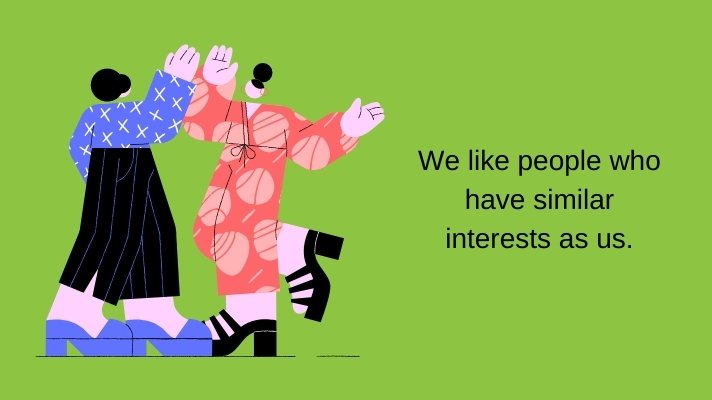
Being social animals, we love to form bonds and relationships with other people.
But have you ever noticed the type of people you like to spend your time with?
Chances are you’ll be attracted by those who are similar to you in one way or the other.
Maybe they like the same movie as you.
Perhaps they belong to the same region as you.
That girl you are so attracted to, maybe her face resembles your mother’s face.
The point is:
“People attract similar people.”
This is the exact opposite of how magnets work.
When using magnets, unlike poles attract each other.
But humans aren’t magnets.
We have a conditioned brain.
We love familiarity.
And as the author says, “Familiarity breeds trust.”
Would you like to be friends with someone who doesn’t have the same values as you? Most probably, not.
That’s the reason why cat-lovers can’t be friends with dog-lovers. There are plenty of examples around you that validate this fact.
Are you getting the point? (I can hear you screaming, “Hell, yeah.”)
Whenever you feel attracted to something or someone, just ask yourself, “why do I like that person?
What unique features do they have that are grabbing your interest?
Why asking these questions is essential?
Knowing what attracts you may help you avoid certain pitfalls.
For instance, if a person figures out what grabs your interest, he might use it to influence you for his selfish cause.
Imagine if a person does that for real. He’d be able to manipulate you.
But on the flip side, if you know what grabs your interest, you might make conscious decisions.
For example, if a Youtuber uses a clickbaity thumbnail, chances are he already knows what you like.
And how did he figure out what you like?
He did his homework and realized that a group of people (audience) shares the same interest –otherwise, why would they subscribe to his channel if they didn’t?
Being self-aware helps you make proper decisions.
So the next time you look for a partner, find out whether your liking is based on familiarity or not.
Like everything else in life, liking isn’t always based on familiarity.
The theory of familiarity that we just discussed is a general case. That means it’s right for most people, but not for everyone.
Talking about decisions, let’s discuss emotions and reason.
Keep reading.
You Need Emotions To Make The Right Decisions And Live A Logical Life.
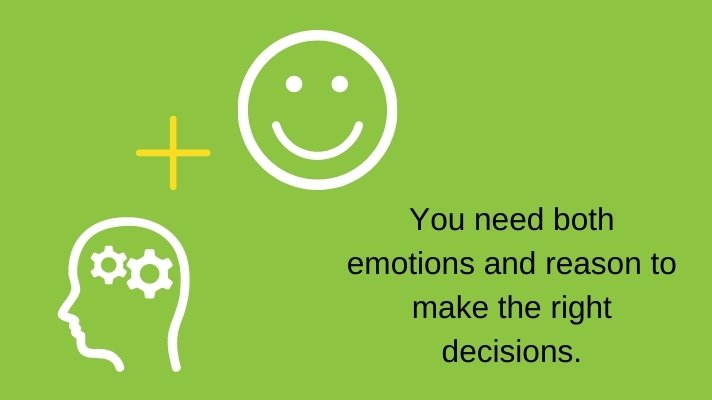
You might have heard people saying, “Be rational. Don’t become emotional.”
Even I mentioned a similar thing in another summary.
But the truth is:
You need both emotions and logic to make the right decision.
Let me explain:
Emotions help you to be empathetic.
They allow us to feel what the other person is feeling.
As a result, emotions will enable you to be moral.
If a person is stripped of his emotions, chances are he would become a sociopath. He wouldn’t be able to see from other people’s eyes and make only logical choices.
For example, logically, the more money you have, the better, right?
Money can be earned both ways: you make it honorably or cheat others.
To an emotionless person who thinks logically, it won’t matter how he gets the money. That person would be okay with tricking people and emptying their pockets.
That emotionless person wouldn’t feel a thing doing terrible acts.
Now again, imagine that his emotions return to him.
What change would you see in that person then? He will start earning money in a moralistic way. If he ever committed any crime, he would feel guilty about it.
Why? Because now, he has emotions.
Emotions make us human.
Does this mean that emotions are everything? No.
Both emotions and reason are essential for our survival.
They both are interconnected. One can’t make the right decisions without either of them.
But sometimes, emotions get out of control. And that creates problems.
That’s why it’s also necessary that you figure out a way to regulate your emotions.
Although emotions and reason are essential, emotions tend to triumph over reason.
So make sure that you are aware enough to train or regulate your emotions.
Are All Men The Same? It Might Be Right.
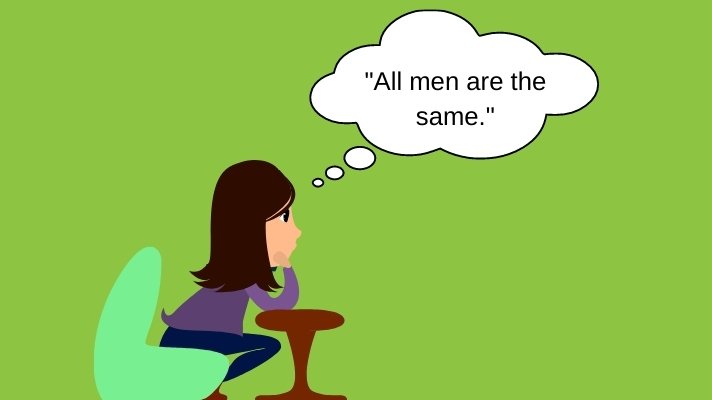
In this book, the author discusses how Julia and Rob formed a relationship.
He discusses every phase of their relationship, starting from how they met each other to how they seduced each other, to how they spent time with their kid.
During his research, the author found that most men don’t give a damn about the character of a woman and are easily impressed by a woman’s beauty or physical appearance.
But on the other hand, women are programmed to judge every man.
Most women take their time to find out whether a man is trustworthy or not.
Why does that happen? It happens because our minds have evolved over time.
Also, biologically, women need someone by their side to take care of them. You know what I mean, right?
So it’s obvious why women think long-term.
Julia also thought about whether Rob was trustworthy or not. When Rob was thinking about how amazing their s%xual life would be, Julia was thinking what kind of father Rob would be and wondering if she should trust him or not.
She wasn’t thinking about what Rob was feeling at that moment.
Coming back to the question, are all men the same?
The answer:
I don’t know.
This lesson just nudged me to think about it.
I can’t make stupid claims.
Anyway, let’s move on to the next lesson.
Your Synapses Are Your Internal Maps.
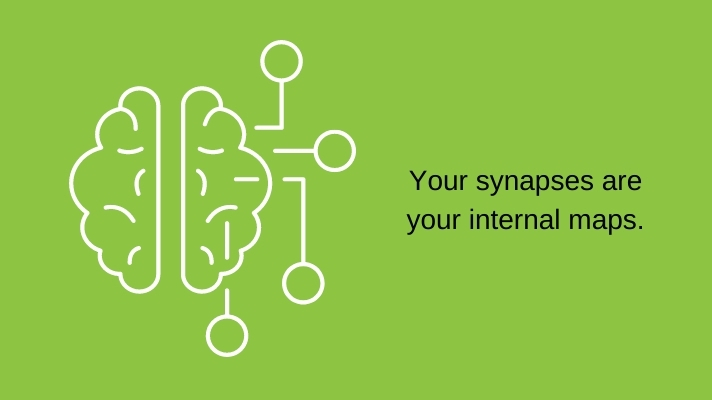
We are pretty complex, to begin with.
Earlier, we had giant skulls.
But now, we have smaller heads and a more complex brain than ever.
You might think of the brain as a web of neurons.
What are synapses?
Synapses are the links between neurons.
With every act you do in your everyday life, neurons are fired, and synapses are formed.
The more you repeat a task, the stronger those connections become.
To put it in simple words: those synapses are why you develop habits. Habits are the patterns formed in our minds.
Why am I calling them maps?
Those internal synapses control your behavior. And thus, they act as a map.
They guide how you think and behave under specific circumstances.
What can you do after learning this fact?
You can choose what patterns you want to form inside your brain. Amazing, isn’t it?
Let me elaborate…
Let’s say you want to become a finance expert. Now what you can do is consume more content related to finance.
Doing so repeatedly would deepen the connections within your brain that store your knowledge of finance.
Every time you’ll read or listen to something about finance, those neurons will get fired up and dance around.
Experts aren’t superhumans.
It’s just that they have formed strong connections inside their brain by repeating specific tasks related to their field of expertise.
That’s the reason why pilots who fly airplanes don’t cripple with fear once they have mastered the art of flying airplanes. That’s where the confidence originates.
And that’s how you get rid of fear.
Your internal-synapses form the GPS of your life. Use it well.
Alright, now you know that most of the action is happening inside your head, and you are unconscious of it.
Lets’ talk more about it in the next lesson…
“Conscious Mind May Be An Illusion” –The Unconscious Is The Real Deal.
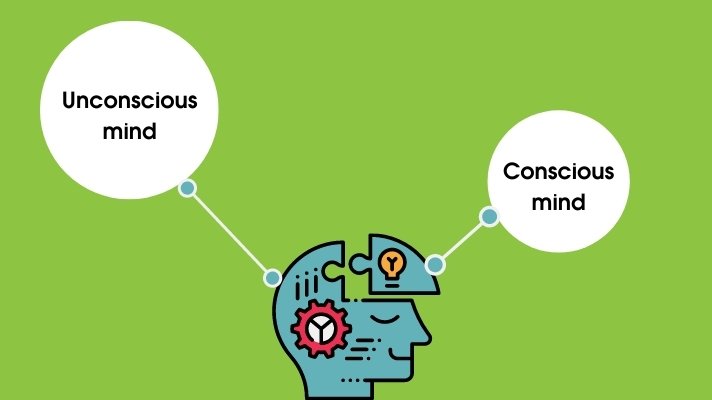
As we just discussed, our unconscious mind does most of the things that drive our day.
But what we are conscious about is the “conscious mind.”
What if our conscious mind is just the tip of the iceberg?
I don’t know much about it. It’s just a theory that somehow piqued my interest.
And theories aren’t much practical by nature.
Even if the unconscious mind is doing most things, we don’t have control over it. It’s isn’t visible to our naked eye.
But yes, the unconscious mind is there. It’s true.
Our body has specific intelligence that somehow carries out complex processes like digestion, respiration, etc., even when we’re sleeping and our conscious minds aren’t at work.
Suppose there was some way to tap directly into the enormous power of our subconscious mind. In that case, we could do wonders unimaginable by humans.
Some people say that you should speak ‘positive affirmations.’
Those aren’t magical words.
Those are merely a way to train our subconscious or unconscious mind.
(I don’t know why there is so much mystery attached to it.)
Many people present it as a magical solution –as if by saying them every day before sleeping, you’ll somehow open doors to heaven.
But if you keep things simple and don’t complicate things inside your mind, you could train your mind to think in a certain way.
Saying those affirmations would dense the connections in your mind.
Anyway, it’s up to you how you train your unconscious by repeating certain acts over and over again.
For now, let’s keep things simple and believe that the conscious mind is very real and under our control.
After all, it helps you make logical or wise decisions every f*cking day.
“Laughter Flows When You Form Bonds.”

Just think about it:
When was the last time you felt ecstatic?
Imagine the happiest time of your life…
What people were around you when you were enjoying that happy moment?
Now think about someone who is an introvert and spends his weekend alone.
He wakes up every morning. He does some stuff. Then sleeps.
Do you think that person you just imagined would be enjoying his life?
Maybe yes. Maybe not.
Okay, let’s come to the main point.
To be happy, you need good relationships.
By ‘relationships,’ I mean not just your family relations but also your inner circle of friends.
You need people with who you can bond and be satisfied just by having them around you.
You need those people that give you those moments of joy and happiness.
Fortunately, being social animals, we are wired to form deep relationships with people like ourselves.
We Change Every Single Day. Who Are We Really?
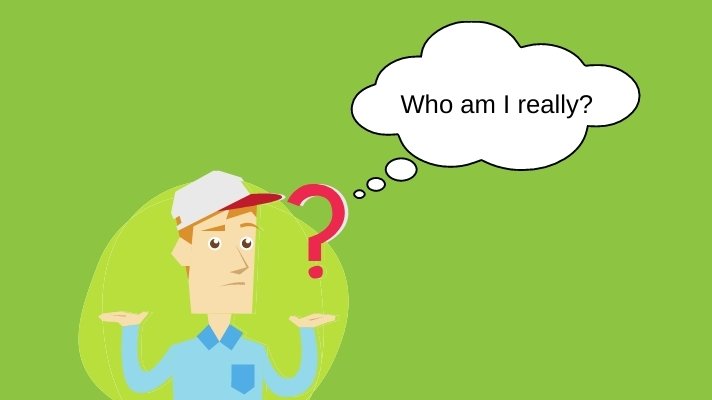
You are changing every single day.
How?
Daily, patterns are formed in your brain, depending upon what you do and how you think.
There hasn’t been a day in your life when you didn’t grow or adapt.
So if you aren’t the same when you wake up every morning, then don’t you think you should wonder, “who am I really?”
If your name is John, you won’t be that same John logically every day.
Why? Because something inside you has changed.
You will be different every day.
Sound confusing?
Yes, it is.
Even philosophers find it very difficult. (According to this book.)
Philosophers have been searching where the true self lies.
This is deep.
And it expands its roots in spirituality.
Who is your true self? Where does the true self exist? Or does true self even exist?
There is a lot to know, right?
Just remember this takeaway that you will never be the same.
You’ll keep on growing and adapting from time to time.
And that will happen both consciously and unconsciously.
Most of it will happen unconsciously, though.
There is no way to monitor your brain while it forms its synapses. (without any scientific equipment)
Still with me?
Good. Keep it up!
Triggering The Right Unconscious Processes Is The Key To Building A Perspective.
There is a reason why unconscious processes inside our minds are called ‘unconscious.’
They are called so because we are not aware of it.
Through his research, the author found that so many people overestimate their abilities.
For instance, the less competent people thought of themselves as more skilled than their peers.
Most people don’t know their unconscious behaviors and habits.
But ironically, they think they know everything about themselves.
But the truth is –they hardly do.
The author also reminds us about the marshmallow experiment, which showed that those who showed self-control were more successful in the future than those who couldn’t resist the temptation.
Whenever you do a task, it starts unconscious processes in your mind.
Those processes determine other processes.
And you hardly realize how much activity is happening inside your brain.
Now, what’s the key idea here?
The key point is that you can control yourself if you learn how to trigger the right unconscious processes.
Put simply: If you learn what triggers what or how habits work, you can build the right habits.
Let that idea sink in.
It’s hard to understand –but worth the effort.
Biographies Might Be Wrong.
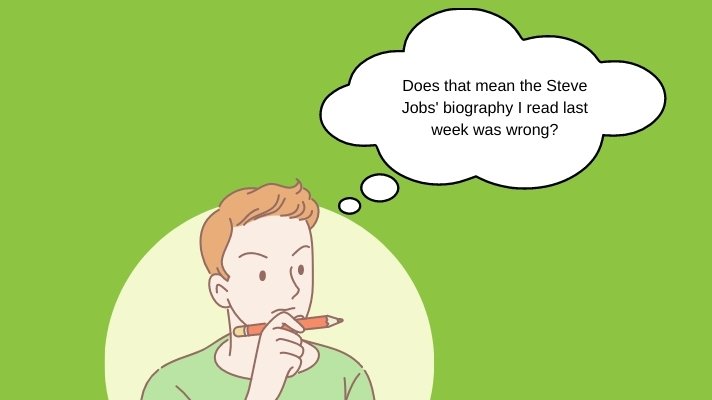
You might have read or probably heard of biographies of successful people. I have read a few too.
But the author says that those biographies might be wrong. Let’s discuss why.
The short answer is:
Nobody knows how and what those so-called successful people felt when they changed history.
Nobody on the earth feels the same every day.
And as I discussed earlier, people change over time.
But when people write biographies, they get restricted in their abilities and try to build a narrative that makes sense. You might ask, “what’s wrong with that?”
Well, the thing is:
Sometimes why people do what they do doesn’t make any sense.
The person whose biography you’ll be reading might have missed some critical details while telling his story to the writer.
Or the writer might have interpreted things differently.
There is a high probability that biographies are wrong and don’t fully represent the real story of the person whose biography has been written.
So should you stop reading biographies? Not really.
You should keep in mind that you can’t know what that person felt while he had his breakthrough moment.
The bottom line is:
You should never blindly follow a person’s biography, and worse, copy them.
Because biographies aren’t always accurate.
The Key Takeaways From ‘The Social Animal’
Let’s recap the key lessons from this summary:
- We like people who share have similar traits as us.
- You need emotions to make the right decisions and live a logical life.
- Your synapses are your internal maps.
- “Conscious mind may be an illusion” –the unconscious is the real deal.
- “Laughter flows when you form bonds.”
- We change every single day.
- Triggering the right unconscious processes is the key to building a perspective.
- Biographies aren’t fully accurate.
You can learn or listen to even more lessons on the Blinkist book summary app. What else will you learn? Here are a few extra things you’ll learn on Blinkist:
- Why context determines our choices.
- How emotions trump rational deliberation.
- Why we are born to connect with each other.
- How sensitivy and self-control can have a massive impact on your success.
Start Blinkist 7-Days Free Trial
The Social Animal Review
[amazon box=”0812979370″ template=”horizontal”]
Well, this book is a little close to fiction.
The author uses characters named Rob, Julia, Harold, etc., and shares different phases of their lives.
You’ll find some interesting or sometimes romantic stories explaining how humans behave during various stages of life.
I’d recommend it to someone who doesn’t like reading non-fiction as the stories are good.
Talking about the length of this book, it could be shorter.
But again, it’s a win-win considering the exciting stories the author has shared.
So take your time with this book.
You’ll learn so much through those stories.
You might even imagine and put yourself in the place of Rob or Harold.
This book is easy to follow.
Language is simple.
Get this book: Check the price on Amazon
You Might Also Like
Other related summaries you might like:
- Mean Genes by Terry Burnham & Jay Phelan
- How Will You Measure Your Life? by Clayton M. Christensen
- 12 Rules For Life by Jordon Peterson
- The 7 Habits Of Highly Effective People by Stephen Covey
Your Turn Now
That’s it.
I hope you enjoyed reading The Social Animal Summary.
There is still so much to learn from this book. I highly recommend that you read this.
Let me know what you think about the above lessons. I’d love to hear your thoughts.
Also, don’t forget to share.
